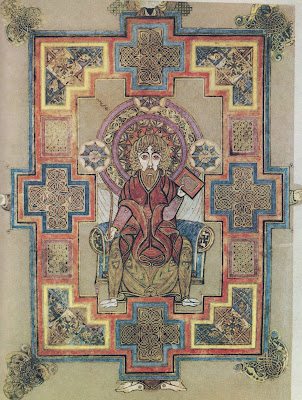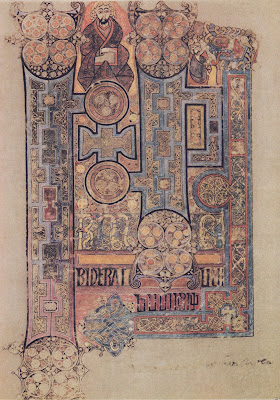REMAINING IN A WORD
INTRODUCTION
The title of my homily for this 5th Wednesday in Lent is, “Remaining In a Word.”
In the beginning of the English translation of today’s gospel there is this interesting sentence, “If you remain in my word, you will truly be my disciples.” Next comes the famous comment, “and you will know the truth, and the truth will set you free.” It’s from John 8: 31-32.
DOODLING
When you were in school - and the moment was totally boring - and you began to doodle, what did you doodle? What did you draw? Was there a cartoon character - a number - a day - a date - a letter - a word - a name - that your drew over and over again?
If by any chance you still have your childhood notebooks, why not check them out - or textbooks - or what have you? You’ll find words underlined or highlighted or you might find question marks or comments.
A classmate of mine - who had a very, very, very high I.Q. - Jack Hamilton - used to draw a character - just his head - eyes, no ears - just his skull and hair line. He drew perhaps 100,001 sketches of this skull. Why? I asked him once and I forgot what his answer was - but I remember seeing him during many a boring class drawing his skulls. No, he didn’t become a plastic surgeon or a skin doctor.
I used to write the number “5” and write it thousands of times. Why? I don’t know why. But I’ve drawn that number “5” on foggy windows and mirrors - and lots of pieces of paper. No, I don't play the lottery.
I also loved letters that I could put characters inside that letter - in the caves of an “O” or an “A” or an “D” or “g” or "e" or “B”. I loved the shelves I could put tiny little drawings of tiny little figures of people on with the letters “E” and “F”.
In time I got to love the history of the development of letters - studying that “B” - which in Hebrew is “Beth” - the word for “House” - and I’d think, “Two Story House”. "Bethlehem" - meant "house of bread". I liked to dabble in and then doodle Chinese Characters - to see the reason for the curves and lines. Fascinating. That's another lifetime - along with Arabic script.
REMAINING
With the time remaining, I love to look up the origins of words - their parts, their roots, their possibilities - with prefixes and suffixes. If I have time - some extra time - when preparing a homily for the day’s readings from the Bible, I like do look up the Hebrew or the Greek - of a word that grabs me in the English translation.
What it does for me is trigger good stuff when I spot certain words that I spent time with in the past. Every time I read the Gospel of John I spot the word “REMAIN” - as in today’s gospel. I hear the Greek word echoing in my memory: “MENO.” I looked up the word in Webster's Dictionary. It has for “remain” that it comes from the Latin word “remanere” - which comes from “re+manere” "to remain" - and Webster adds, “more at mansion”. At "mansion" it tells me that mansion is about what is not destroyed, what continues unchanged - what stays. Then I also notice at “mansion” - that it's from the Greek word “MENO” - dwelling, residence, manor, house. Next I noticed the very interesting comment in Webster under “Mansion” - “one of the 28 parts into which the moon’s monthly course through the heavens is divided”. Isn’t that very intriguing? Who had time to doodle those 28 images - while looking at the moon in the night sky?
What do I doodle? Where do I dwell? Where do I spend my time? What are the life experiences that remain?
If I read anything into the Gospel of John, it’s John’s desire that I remain with Jesus. It’s that we dwell in Jesus. It’s that this word “Jesus” - this person, Jesus, becomes flesh in me.
CONCLUSION
My name is Andrew and I love it in the Gospel of John that it was Andrew who is the first person there in the first chapter who goes up to Jesus and asks him, “Where do you live [MENEIS]?” and Jesus says to him, “Come and see” and Andrew went with Jesus “and saw where he lived [MENEI] and stayed [EMEINAN] with him the rest of the day” and the next day he went to his brother Peter and told him, “We have found the Messiah” - and the rest is history.
Okay, I have to admit - for the sake of honesty - besides you can look up the First Chapter of the Gospel of John as well,that it was John the Baptist who pointed Jesus out to Andrew. However, it was Andrew who made that first move …. and the rest is history.
So if you doodle, if you like to doodle words, doodle the word “remain” - draw yourself into those little caves in the small letters “e” and “a” or hide under the “r” or the arches in “m” and “n”. Remain with Jesus in there in prayer - and let Jesus - the word sent from the Father - become flesh and fresh in you.
And by the way, I don’t think this is too far fetched - have you ever stopped to look at Gaelic lettering - and monastic copies of the Bible? Those monks and those artists did some amazing doodling on their manuscripts. I’m sure monastery bells rang - and some monk was lost inside some letter he was painting and remained with it for the longest time - perhaps deep, deep in prayer, deep, deep in Jesus - missing a meal, but not missing Jesus..
+O*+O*+
Image on top: Portrait of St. John the Evangelist in the Book of Kells. It was a wonderful moment when on a trip with folks from this parish we saw some of the Book of Kells in Trinity College, Dublin, Ireland. Notice that soft cushy chair John is sitting on. I was wondering: "Did the monk who drew this wish he was on a soft easy chair like that?"
Image on the bottom - below this: Ornamental text, "In principio erat verbum", Chapter 1, verse 1, of the Gospel of John - repeated in the bottom margin in a later hand."
Both Images can be found in The Book of Kells, Forty-Eight Pages and Details in Colour from the Manuscript in Trinity College, Dublin, selected and introduced by Peter Brown, Librarian of Trinity College, Dublin, Thames and Hudson, 1980, pages 41 and 43.
P.S. This was a "Doodle Sermon" - didn't have to preach today - but I enjoyed fooling around with the word "remain" in today's gospel. Amen.




